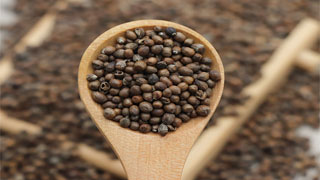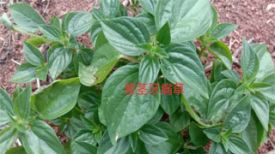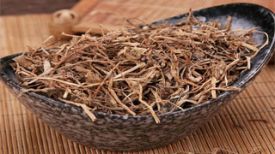
1. Alias
Bu Jingzi, Huang Jinzi.
2. Plant morphology
Deciduous shrubs or small trees. Up to 6 meters high, with fragrant branches and leaves. New branches square, gray white, densely covered with fine hairs. Ye Duisheng; Palm shaped compound leaves, long stalks, usually five out, sometimes three out; The small leaves are elliptical ovate in shape, measuring 4-9 cm in length and 1.5-3.5 cm in width. The tip is pointed, the base is wedge-shaped, and the entire margin is or lightly wavy. The upper part is light green, with sparse short hairs and fine oil spots. Below is white, densely covered with white fur. Cone inflorescence, terminal; Calyx bell shaped, 5-toothed cleft; Corolla light purple, lip shaped, about 6 millimeters long, with two upper lips and three lower lips; Stamens 4, 2 strong; The ovary has 4 chambers, the style is linear, and the stigma is 2-lobed. Drupe, egg shaped spherical, brown, with a diameter of about 2.5 millimeters, the lower half enclosed in the calyx. The flowering period is from July to August, and the fruiting period is from August to September.
3. Origin distribution
Born in the sunny mountainous area. Distributed in East China, Henan, Hubei, Guangdong, Guangxi, Guizhou, Sichuan and other places.
4. Harvesting and processing
Harvesting fruits in autumn when they are ripe, rubbing them by hand, drying them in the sun, and cleaning them thoroughly.
5. Characteristics of medicinal herbs
Spherical in shape, slightly larger and flatter at the upper end, slightly pointed at the lower end, about 3 millimeters long and 2 millimeters in diameter; The calyx is grayish brown, densely covered with brown fine hairs, surrounding about 2/3 of the entire fruit, but most of them have already fallen off; The base has a short stem; The fruit has a brownish appearance, is relatively smooth, and has obvious longitudinal veins on the surface. The skin is thick and hard, and is not easily broken. There are several white seeds hidden inside. Fragrant aroma, bitter taste with a hint of astringency.
6. Sexual Taste Returning to the Classics
Warm in nature, spicy and bitter in taste. Return to the lung meridian, stomach meridian, and liver meridian.
7. Effect and Function
Dispelling wind and relieving symptoms, resolving phlegm and cough, promoting qi circulation and relieving pain. The Xinwen Jiebiao medicine belongs to the subcategory of Jiebiao medicine.
8. Clinical application
Use 3-10 grams. Used to treat colds, coughs, asthma, chronic bronchitis, food stagnation, and liver and stomach pain.
9. Pharmacological research
Has cough suppressant, asthma relieving, anti-inflammatory, and antimicrobial effects. The decoction has inhibitory effects on Staphylococcus aureus and Staphylococcus aureus in test tubes.
10. Chemical composition
Dry products contain 0.1% essential oil, which contains 1,8-eucalyptol, 1-coumarine, 1-2 pinene, camphene, caryophyllene, as well as diterpenes, sesquiterpenes, and dienes. It still contains flavonoids and cardiac glycosides. It also contains components such as p-hydroxybenzoic acid, 5-oxoisophthalic acid, 3- β - acetoxy-12-oqueen-27-carboxylic acid, artemisinin, 8,25-lanostadiene-3p-ol, oleic acid, linoleic acid, etc.
11. Usage taboos
People with damp heat, dryness, thirst, and no qi stagnation should avoid taking it.
12. Compatibility prescription
① To treat flu, cough, rheumatic pain, and warm up pain: 10g each of Huangjingzi, Wanjingye, and Qianfengguang, rock sugar. Study together in detail. Take 10-15 grams each time, 2-3 grams per day, and rinse with boiling water. (Chinese Ethnic Medicine Chronicles)
② Treatment for asthma: 6-15 grams of Huangjingzi. Grind powder and sugar in moderation, twice a day, take with water. (Commonly Used Chinese Herbal Medicines in Nanjing)
③ Treating liver and stomach pain: Grind Huangjingzi powder and mix it with flour to make a group meal. (Compendium Collection)
④ Treat gastric ulcer and chronic gastritis: 30g of dried Huangjing fruit, decoct or grind and swallow. (Commonly Used Chinese Herbal Medicines in Nanjing)
⑤ Treatment for hernia: 9 grams each of Huangjingzi and fennel, and 12 grams of lychee seeds. Boil it in water. (Gansu Chinese Herbal Medicine Handbook)
⊙ The content of the article is for clinical reference only. Non TCM professionals are not allowed to test drugs.


